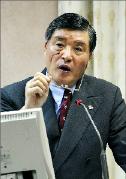The Ministry of National Defense yesterday said that following the arrest of a senior official on suspicion he was spying for China, the military has decided to give all military officials stationed overseas a polygraph test before, during and after their posting.
Minister of National Defense Kao Hua-chu’s (高華柱) remarks came after one-star General Lo Hsien-che (羅賢哲) was arrested in late January on charges of spying for China.
According to preliminary investigations, Lo was recruited by Chinese intelligence in 2005, when he was a defense attache in Thailand.

Photo: George Tsorng, Taipei Times
‘TEST OF LOYALTY’
Kao called the polygraph test proposal a “test of loyalty.”
Chinese Nationalist Party (KMT) Legislator Lin Yu-Fang (林郁方) said that after returning from Thailand, Lo became head of communications and electronic information at the Army Command Headquarters.
When asked if Lo had undergone a lie detector test before assuming the position, Kao said he had not.
Lin said he supported immediate amendments to the National Intelligence Services Act (國家情報工作法) making it compulsory for intelligence officials stationed abroad or taking a vacation to undergo a polygraph test.
Democratic Progressive Party Legislator Tsai Huang-liang (蔡煌瑯) said military officials could feel slighted if they were to take lie detector test, to which Kao said: “National security is more important.”
AIRPORT CLOSING
Meanwhile, Kao said the military planned to close a navy airport near Taiwan Taoyuan International Airport, adding the land should be added to the Taoyuan Aviation Special Zone.
Lin said that once the military acquired P-3C “Orion” marine patrol warfare aircraft from the US, it had proposed deploying six at Taoyuan, three in Pingtung County and three in Hualien County.
Lin said he feared closing the military base in Taoyuan would undermine those plans.
Kao said the aviation special zone was one of government’s most significant construction projects and that as the military had found an alternative scheme, closing the base would not have an impact on national security.

The Ministry of Economic Affairs has fined Taobao NT$1.2 million (US$36,912) for advertisements that exceed its approved business scope, requiring the Chinese e-commerce platform to make corrections in the first half of this year or its license may be revoked. Lawmakers have called for stricter enforcement of Chinese e-commerce platforms and measures to prevent China from laundering its goods through Taiwan in response to US President Donald Trump’s heavy tariffs on China. The Legislative Yuan’s Finance Committee met today to discuss policies to prevent China from dumping goods in Taiwan, inviting government agencies to report. Democratic Progressive Party Legislator Kuo Kuo-wen (郭國文) said

The Ministry of Economic Affairs has fined Taobao NT$1.2 million (US$36,900) for advertisements that exceeded its approved business scope and ordered the Chinese e-commerce platform to make corrections in the first half of this year or its license would be revoked. Lawmakers have called for stricter supervision of Chinese e-commerce platforms and more stringent measures to prevent China from laundering its goods through Taiwan as US President Donald Trump’s administration cracks down on origin laundering. The legislature’s Finance Committee yesterday met to discuss policies to prevent China from dumping goods in Taiwan, inviting government agencies to report on the matter. Democratic Progressive Party

Taiwan and its Pacific ally Tuvalu on Tuesday signed two accords aimed at facilitating bilateral cooperation on labor affairs, according to Taiwan’s Ministry of Foreign Affairs (MOFA). The governments inked two agreements in Taipei, witnessed by Foreign Minister Lin Chia-lung (林佳龍) and visiting Deputy Tuvaluan Prime Minister Panapasi Nelesone, MOFA said in a news release. According to MOFA, the agreements will facilitate cooperation on labor issues and allow the two sides to mutually recognize seafarers’ certificates and related training. Taiwan would also continue to collaborate with Tuvalu across various fields to promote economic prosperity as well as the well-being of their

Sung Chien-liang (宋建樑), who led efforts to recall Democratic Progressive Party (DPP) Legislator Lee Kun-cheng (李坤城), was released on bail of NT$80,000 today amid outcry over his decision to wear a Nazi armband to questioning the night before. Sung arrived at the New Taipei District Prosecutors’ Office for questioning in a recall petition forgery case last night wearing a red armband bearing a swastika, carrying a copy of Adolf Hitler’s Mein Kampf and giving a Nazi salute. Sung left the building at 1:15am without the armband and covering the book with his coat. Lee said today that this is a serious